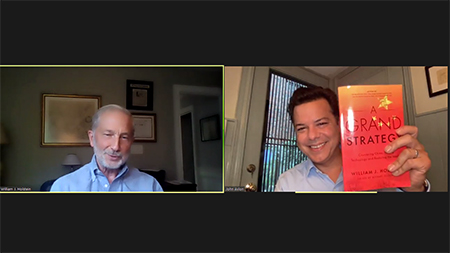William J. Holstein Examines The Rise Of China And A Teetering News Industry
In his new book, OPC Past President William J. Holstein weaves his own personal experience as China correspondent in the late 1970s and early 1980s, with four decades of insight as a close observer of the country’s trajectory, commenting on the critical state of global media and technology’s role as a driver of change.
On July 7, 2021, Holstein discussed A Grand Strategy: Countering China, Taming Technology and Restoring the Media, with OPC Governor John Avlon, senior political analyst and anchor at CNN.
Holstein launched his career in international journalism in Hong Kong in 1979 working as correspondent for United Press International. Part of his job was covering southern China, where the country’s economic modernization efforts were launched. As a result, he won the 1979 Overseas Press Club Award for Best Business-News Reporting from Abroad. After serving in Hong Kong, he became Beijing bureau chief for UPI until his return to the U.S. in 1982. His insight was that he saw most Chinese people showing more interest in the trappings of modern life, meaning Western luxury goods, than in the socialist class struggle of the Cultural Revolution.
“All the early evidence was that yes, they want economic modernization, they want political liberalization, they want to break away from the tyranny of the Cultural Revolution,” he said. “All the early indications, I’d say for decades, were that this was a great success story, not only for China but for the world.”
But Holstein said a combination of optimism and Western bias caused American journalists and China observers to believe the country would evolve from authoritarian rule to greater liberalization. That naïve notion, Holstein said, led many to be caught flat footed when Xi Jinping became president in 2012 and reasserted the power of the Chinese Communist Party.
“Our China-watching establishment got it profoundly wrong. We had no idea who this man was,” he said, adding that Henry “Hank” Paulson Jr., former U.S. Secretary of the Treasury, at the time framed Xi as a great liberalizer with ties to the West who would open financial markets.
Holstein said these blind spots enabled American companies to help China in building its surveillance state, including the so-called “Great Firewall” that selectively blocks digital communications.
“Basically, they’ve developed a form of censorship that [allows them to] control all of the information that goes into China. Very few Western news organizations are able to disseminate their information there, and the ones that do are very careful to toe the line, to only communicate financial information or certain information that doesn’t violate the Chinese Communist Party’s edicts.”
He said while Big Tech companies in the U.S. have also used data collection and algorithms to monitor and control the lives of users, “it’s not our government that knows when we’re waking, when we’re breathing, when we’re walking, when we’re not walking.”
Holstein cited examples of Western companies aiding China’s use of technology, including Microsoft helping China build its Artificial Intelligence capabilities, which may be more sophisticated in some areas than America’s Cisco building the Great Firewall, Intel selling more semiconductors to China than the U.S., Qualcomm semiconductors turning up in the Chinese military, Nvidia graphics chips being used for surveillance of Uighurs in Xinjiang, and Thermo Fisher selling DNA testing equipment that Chinese authorities use to build genetics databases of suspected troublemakers.
He said hundreds of American CEOs he has interviewed over the years have embraced the concept of globalization and sell technology anywhere in the world, yet do not accept responsibility for how those tools are used.
“One of the most sensitive and difficult debates that we face is can the American government work with American business in mitigating the rise of a technological powerhouse that represents a clear challenge to our interests,” Holstein said. “It is a first-class intellectual challenge. Can we cooperate as Americans across public-sector versus private-sector lines? Can we pool our expertise, or can’t we? Without abandoning our values or abandoning the things we care about, we need to figure out how to become more cohesive engaging in these very subtle and very sophisticated kinds of conflict.”
In his book, Holstein also writes about what Avlon called the winnowing of American journalism and how the news establishment got “hollowed out.”
Holstein said that every news organization he’s worked for has either gone bankrupt or were sold for a pittance, including UPI, BusinessWeek, US News and World Report, and Business 2.0. He said the rise of social media giants has absorbed much of the work journalists do, with major platforms negotiating over what news organizations should get paid and cannibalizing ad revenue that once sustained the industry.
He said journalists have an urgent mission to think outside of the daily grind of getting stories and beating the opposition.
“How do we recreate an American media that is not dominated by the algorithms that intentionally and consciously create division? How can we rescue ourselves from the clutches of the vulture capitalists?”
Holstein served as OPC President from 1994 to 1996. He has been active as an awards judge and organizer of OPC programs. He also serves as president of the OPC Foundation.
He is the author of nine books, including Did The American Media Get China Wrong?, based on discussions at an OPC reunion of China hands in 2014.
Click here to watch a playlist of videos from the evening.




